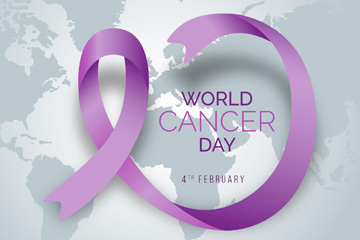Cancer is a critical health issue that affects millions worldwide. It has a staggering death toll rate – every year, up to 9.6 million people die from cancer. But do you know that about one-third of common cancers are preventable and treatable? More than one-third of cancer cases can be prevented and another third can be cured if detected early and treated properly. Proper implementation of resource-appropriate strategies for prevention, early detection and treatment can save up to 3.7 million lives every year. As a path to that, February 4 is observed as World Cancer Day to raise awareness about cancer and encourage people to work to make it a global health priority.
This initiative was taken by the Union for International Cancer Control (UICC) to inform and encourage people on Cancer’s prevention, early detection, and treatment. This year, the the theme of the World Cancer Day is “I am and I will,” a reminder that each one of us can play a role in reducing the impact of cancer.
Cancer is a heterogeneous group of dangerous diseases that results from abnormal cell growth. This abnormal growth often invades surrounding tissue and spreads to other parts of the body making it the second-leading cause of death in the world. In fact, the American Cancer Society (ACS) has estimated that, in 2021, 1.9 million new cancer cases will be diagnosed and there will be 608,570 cancer deaths in the United States alone.
Started as a 3-year campaign, 2021 marks the final year of the ‘I Am and I Will’ campaign. This multi-year campaign was aimed at creating a long-lasting impact by raising public-facing exposure and engagement, and providing more opportunities to build global awareness and impact-driven action. Being the last year of the campaign, 2021 World Cancer Day would show us that our actions had an impact on everyone around us, within our neighborhoods, communities and cities. Also, this year is a reminder of the enduring power of cooperation and collective action, which shows us that, when we choose to come together, we can achieve what we all wish for: a healthier, brighter world without cancer. Together, all of our actions matter.
Cancer can be prevented with the right strategies. For many cancers, there are warning signs and symptoms and the benefits of early detection are indisputable. Taking time to get that early check-up and speaking up with your doctor can help create awareness and peace of mind.
A major cancer prevention tip is to lower your risk of developing certain cancers by limiting your exposure to avoidable risk factors. These risk factors include:
- Alcohol
- Cancer-Causing Substances (such as Aflatoxins, Aristolochic Acids, Arsenic, Asbestos, Benzene and so on)
- Chronic Inflammation
- Diet
- Immunosuppression
- Infectious Agents
- Obesity
- Radiation
- Sunlight
- Tobacco
Other Cancer-Prevention Tips:
- Walk more and Sit Less: Avoid sedentary lifestyle. The greater the amount of physical activity, the greater the benefit is. Experts recommend being physically active for at least 30 minutes every day.
- Breastfeed your Baby (if you can): The World Health Organization (WHO) advises mothers to breastfeed their babies for six months. After six months, they are advised to breastfeed along with providing appropriate complementary foods for up to two years. Breastfeeding can help breast cancer and protect the child against infections and other childhood diseases.
- Get Vaccinated: Certain viruses increase risk of cancer, therefore get immunizations as it may help prevent those viruses, including hepatitis B, which increases the risk of liver cancer, and human papillomavirus (HPV), which increases the risk of cervical cancer and other cancers. Ask your doctor whether immunization against these viruses is appropriate for you (www.mayoclinic.org).
- Early Treatment: With early detection, many cancers can be treated and cured with the help of surgery, radiotherapy or chemotherapy. As Mayo Clinic notes, developments in cancer screening and cancer treatment are improving the survival rates for many types of cancer.
Cancer can be a difficult topic to address, particularly in some cultures and settings. This World Cancer Day, we can take a pledge to join the fight against cancer and deal with the disease openly, as it can improve outcomes at an individual, community and policy level. Through raising the public and political literacy around cancer, we can reduce fear, increase understanding, dispel myths and misconceptions, and change behaviors and attitudes (www.worldcancerday.org).
